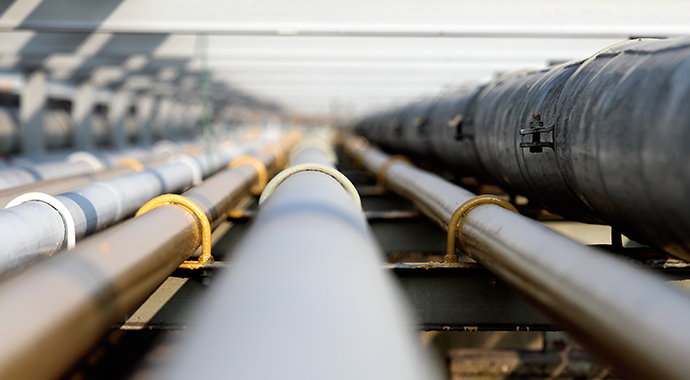Protecting Nigeria’s Oil and Gas Infrastructure: The Importance of Pipeline Valve Leak Monitoring
Protecting Nigeria’s Oil and Gas Infrastructure: The Importance of Pipeline Valve Leak Monitoring
Nigeria’s oil and gas infrastructure is the lifeblood of the country’s economy, but it is constantly under threat from leaks and sabotage. In this blog post, we will explore the importance of pipeline valve leak monitoring in protecting these vital assets. Join us as we delve into the technology and strategies that can help safeguard Nigeria’s valuable resources for generations to come.
Introduction to Nigeria’s Oil and Gas Industry
Introduction to Nigeria’s Oil and Gas Industry
Nigeria’s oil and gas industry plays a crucial role in the country’s economy, accounting for over 90% of its export earnings and contributing to about 65% of government revenue. With vast reserves estimated at around 37 billion barrels of oil and 5 trillion cubic meters of natural gas, Nigeria is the largest producer of crude oil in Africa and among the top ten globally.
The discovery of oil in commercial quantities in Oloibiri, Bayelsa State in 1956 marked the beginning of Nigeria’s journey into becoming an oil-producing nation. Since then, the industry has experienced significant growth, attracting foreign investment and creating job opportunities for millions of Nigerians. The sector has also contributed to infrastructure development, with major projects such as refineries, pipelines, storage facilities, and export terminals.
Oil production activities are mainly concentrated in the Niger Delta region where most of Nigeria’s onshore and offshore fields are located. This area is also home to various indigenous communities whose livelihoods depend on fishing and farming. However, decades of unsustainable practices by multinational corporations have led to environmental degradation that has had adverse effects on these communities’ health and economic well-being.
In recent years, there have been increasing concerns about pipeline safety in Nigeria due to frequent incidents such as leaks, ruptures, vandalism, sabotage, and explosions. These incidents not only endanger workers but also pose a severe threat to local communities living near these pipelines.
According to data from the Nigerian National Petroleum Corporation (NNPC), between January 2019 and September 2020 alone, there were about 45 reported cases of pipeline vandalism leading to substantial losses worth billions of naira. These losses not only affect revenue but also disrupt production operations leading to supply disruptions both domestically and internationally.
To address these challenges facing the industry, there have been efforts by both government agencies such as NNPC and private companies operating in the sector to improve infrastructure and ensure pipeline safety. One of the critical measures being implemented is the use of advanced technology such as pipeline valve leak monitoring systems.
Nigeria’s oil and gas industry has been instrumental in driving economic growth and development. However, the frequent incidents of pipeline leaks and vandalism are a cause for concern, not only for the industry but also for local communities and the environment. The next section will delve into why protecting Nigeria’s oil and gas infrastructure through effective leak monitoring is crucial in ensuring sustainable operations in this vital sector.
Importance of Pipeline Infrastructure in the Industry
The oil and gas industry is the backbone of Nigeria’s economy, accounting for a large portion of its GDP and government revenue. The country is one of the largest producers of crude oil in Africa, with an estimated 37 billion barrels of proven reserves. However, with this significant production comes the responsibility to protect and maintain the critical infrastructure that enables the extraction, transportation, and distribution of oil and gas. In particular, pipeline infrastructure plays a crucial role in ensuring a smooth flow of resources throughout the country.
Pipelines are essentially long tubes made of steel or plastic that transport liquids such as crude oil and natural gas over long distances. They are buried underground or run along onshore or offshore routes to connect production sites to refineries, storage facilities, and distribution centers. Pipelines are an efficient mode of transportation for oil and gas products as they can move large volumes quickly at relatively low costs compared to other means like trucks or ships.
The importance of pipelines in the Nigerian oil and gas industry cannot be understated. They serve as a lifeline for delivering hydrocarbons from remote locations to domestic markets or export terminals. Without pipelines, it would be nearly impossible to meet demand for these essential resources both domestically and abroad.
Moreover, pipeline infrastructure also plays a vital role in minimizing environmental hazards associated with transporting hydrocarbons through alternative modes such as road tankers or railcars. By using pipelines instead, there is less risk of accidents such as spills that can harm local ecosystems and communities.
In addition to their economic value, pipelines also contribute significantly to job creation within Nigeria’s borders by supporting various industries such as construction, engineering services, maintenance operations, security personnel recruitment agencies among others.
However valuable they may be; pipelines can also pose significant risks if not adequately monitored and maintained regularly. One major concern is leaks caused by corrosion or mechanical damage which can result in severe consequences including environmental disasters like explosions or fires.
This is where advanced leak detection systems, specifically valve leak monitoring, come into play. By installing sensors and software systems to detect and alert operators of potential leaks in pipelines, the risk of accidents can be significantly reduced. This technology allows for quick response times, ensuring that any leaks are detected and addressed promptly before they escalate into major incidents.
Pipeline infrastructure is essential to Nigeria’s oil and gas industry. Its role in transporting hydrocarbons safely, efficiently, and cost-effectively cannot be ignored. With the right measures in place like implementing advanced leak detection systems such as valve leak monitoring, the country can ensure the continued protection of its critical pipeline infrastructure for sustainable economic growth.
The Need for Leak Monitoring
The oil and gas industry plays a crucial role in Nigeria’s economy, accounting for over 90% of its export earnings. However, the constant threat of pipeline leaks poses a significant challenge to the sustainability and profitability of this sector. Pipeline leaks not only result in financial losses but also have severe environmental and social impacts.
It is estimated that Nigeria loses about $7 billion annually due to pipeline vandalism, theft, and operational failures. These losses are mainly attributed to the lack of effective leak monitoring systems, which makes it difficult for operators to detect leaks early enough and take necessary actions. This highlights the urgent need for improved leak monitoring methods to protect Nigeria’s oil and gas infrastructure.
One of the primary reasons why leak monitoring is crucial is because it helps prevent catastrophic incidents such as explosions or fires. When a leak occurs in a pipeline carrying highly flammable substances like crude oil or natural gas, there is an increased risk of ignition resulting in devastating consequences. With proper leak monitoring systems in place, operators can quickly identify potential leaks and take immediate action to prevent any accidents from occurring.
Additionally, effective leak monitoring enables operators to minimize financial losses by reducing product wastage. When there is a leak in a pipeline, valuable resources are lost as they spill into the environment instead of reaching their intended destination. This results in decreased production levels and revenue generation for both companies and the government. By implementing reliable leak monitoring systems, operators can detect leaks early on and reduce these financial losses significantly.
Furthermore, continuous monitoring of pipelines can help identify potential threats such as corrosion or third-party interference before they escalate into major issues. Regular inspections through manual checks may not always be feasible due to time constraints or difficult-to-access locations along pipelines. In such cases, automated leak detection systems provide real-time data on pressure changes or flow rates that indicate possible leakage points along the pipeline route.
Investing in advanced technologies for leak monitoring is essential for protecting Nigeria’s oil and gas infrastructure. It not only helps prevent accidents and minimize financial losses but also ensures the sustainability of this critical sector for the country’s economy. As pipelines continue to play a vital role in transporting oil and gas across Nigeria, it is imperative that operators prioritize leak monitoring as a crucial aspect of their overall risk management strategy.
What is Pipeline Valve Leak Monitoring?
Pipeline valve leak monitoring is a crucial aspect of protecting Nigeria’s oil and gas infrastructure. It is an essential process that involves the continuous monitoring, detection, and identification of leaks in pipeline valves. Pipeline valves are key components in the transportation of crude oil and natural gas from production sites to refineries and distribution centers. They serve as control points for regulating the flow of these resources, making them critical elements in maintaining overall pipeline integrity.
The primary purpose of pipeline valve leak monitoring is to ensure the safe and efficient operation of pipelines by detecting any potential leaks early on. This allows for prompt action to be taken, preventing catastrophic incidents such as explosions or environmental disasters. The process involves using sophisticated tools and techniques to monitor changes in pressure, temperature, flow rate, and other vital parameters that can indicate a possible leak.
One commonly used method for pipeline valve leak monitoring is through the use of sensors installed along the length of the pipeline. These sensors are capable of detecting minute changes in pressure or flow rate accurately. In case there is a sudden drop in pressure or an increase in flow rate at a particular section of the pipeline, it can indicate a potential leak at that specific location.
Another method used for pipeline valve leak monitoring is through regular visual inspections carried out by trained personnel. These inspections involve physically checking each valve for any signs of corrosion or damage that could lead to leakage. Regular maintenance checks also play a significant role in ensuring that valves are functioning correctly and have no underlying issues that could cause leaks.
In addition to these methods, advanced technologies such as satellite imaging and drone surveillance have also been employed for more accurate detection of potential leaks over large geographic areas quickly.
The importance of effective pipeline valve leak monitoring cannot be overstated when it comes to safeguarding Nigeria’s oil and gas infrastructure. Not only does it help prevent costly damages caused by spills or explosions but also ensures minimal disruption to operations resulting from unscheduled shutdowns due to faulty valves.
Pipeline valve leak monitoring is a critical aspect of protecting Nigeria’s oil and gas infrastructure. It involves continuously monitoring crucial parameters to detect any potential leaks early on, allowing for prompt action to be taken. With the use of advanced technologies and regular maintenance checks, pipeline valve leak monitoring can effectively mitigate risks and ensure the safe and efficient operation of pipelines in Nigeria.
Benefits of Implementing a Leak Monitoring System
A leak monitoring system is a vital component in protecting Nigeria’s oil and gas infrastructure. It helps to detect and prevent leaks in pipelines, which can lead to environmental damage, loss of revenue, and safety hazards. In this section, we will discuss the numerous benefits of implementing a leak monitoring system.
1. Early Detection of Leaks:
One of the significant advantages of having a leak monitoring system is its ability to detect leaks at an early stage. This allows for quick and effective action to be taken before the situation escalates into a major disaster. By detecting leaks early on, companies can save time, money, and resources that would have been spent on repairing or cleaning up after a significant leakage.
2. Minimizes Environmental Impact:
Pipeline leaks not only cause financial losses but also have severe environmental consequences. Oil spills can contaminate water bodies, affect marine life, and harm surrounding vegetation. With a leak monitoring system in place, companies can quickly identify the location of a leak and contain it before it causes widespread damage.
3. Reduces Downtime:
Pipeline shutdowns due to leaks result in production delays, leading to significant financial losses for oil and gas companies. Installing a reliable leak monitoring system ensures that any potential leakage is detected early enough for maintenance teams to respond promptly without disrupting operations significantly.
4.Promotes Safety:
Leaks pose serious safety risks for workers operating near pipelines as well as nearby communities. A malfunctioning pipeline could release toxic gases or ignite fires if left undetected for an extended period. A robust leak monitoring system provides continuous surveillance of pipelines 24/7, ensuring that any potential hazards are identified immediately.
5.Improves Maintenance Planning:
A comprehensive leak monitoring system collects data on pipeline performance over time. This information is invaluable for maintenance planning as it helps identify potential weak points along the pipeline that may require repair or replacement before they become critical issues.
6.Cost-Effective Solution:
While the initial cost of installing a leak monitoring system may seem expensive, it is a cost-effective long-term solution. The potential financial losses from pipeline leaks far outweigh the investment in a reliable monitoring system.
Implementing a leak monitoring system is an essential step towards safeguarding Nigeria’s oil and gas infrastructure. It not only saves money and resources but also protects the environment and promotes safety for workers and nearby communities. With advanced technology and continuous improvement, these systems have become more reliable, accurate, and cost-effective than ever before. Investing in a robust leak monitoring system is crucial for any company looking to mitigate risks associated with pipeline leaks.
Case Studies of Successful Implementation in Nigeria
Case studies are an effective way to understand the practical application and success of a particular strategy or technology. In this section, we will discuss some case studies of successful implementation of pipeline valve leak monitoring in Nigeria.
One such case study is the implementation by Nigerian National Petroleum Corporation (NNPC) in their Nembe Creek Trunk Line (NCTL) in 2017. The NCTL is a major pipeline for crude oil transportation, spanning over 110 kilometers from Bonny Export Terminal to Cawthorne Channel Field. With frequent incidents of pipeline sabotage and theft, NNPC was facing significant losses and disruptions in production.
In collaboration with an international company specializing in leak detection technology, NNPC implemented real-time remote monitoring on critical valves along the NCTL. This involved installing acoustic sensors at strategic locations on the pipeline and connecting them to a central control room. The sensors could detect any leaks or changes in pressure and immediately send alerts to the control room for prompt action.
The results were impressive – within just three months of implementing this system, NNPC recorded a 90% reduction in incidents of theft and vandalism on the NCTL. This not only saved the corporation millions of dollars but also ensured uninterrupted production and supply of crude oil.
Another successful case study is that of Chevron Nigeria Limited’s Escravos-Lagos Pipeline System (ELPS). The ELPS is an important pipeline network that supplies gas to power plants across southern Nigeria. With increasing incidents of third-party interference leading to disruptions in gas supply, Chevron implemented an advanced leak detection system using fiber-optic cables along the length of the pipeline.
This system allowed for continuous monitoring and early detection of any leaks or damages along the pipeline, enabling prompt response and repairs before any major incident could occur. As a result, Chevron saw a significant decrease in downtime due to leak-related issues, ensuring reliable supply to their customers.
Moreover, this technology also helped identify potential weak spots in the pipeline, allowing for proactive maintenance and replacement, further reducing the risk of future incidents.
These case studies demonstrate the effectiveness and importance of pipeline valve leak monitoring in protecting Nigeria’s oil and gas infrastructure. With the right technology and strategies in place, corporations can mitigate risks, minimize losses, and ensure a safe and reliable supply of energy resources.
Introducing Wigmore Trading’s Solutions
Introducing Wigmore Trading’s Solutions:
As a leader in the industrial supply and services sector, Wigmore Trading understands the critical importance of protecting Nigeria’s oil and gas infrastructure. With over 20 years of experience in providing top-quality products and services to various industries, we have developed innovative solutions specifically tailored for the unique challenges faced by the oil and gas industry.
One of our key solutions is our state-of-the-art pipeline valve leak monitoring system. This technology has been designed to detect leaks in pipelines quickly and accurately, allowing for prompt response and mitigation measures to be taken. With frequent incidents of sabotage, vandalism, and other forms of damage to pipelines in Nigeria, early detection is crucial to prevent major environmental disasters and economic losses.
Our pipeline valve leak monitoring system utilizes advanced sensors that are strategically placed along the pipeline network. These sensors continuously monitor pressure levels, flow rates, temperature changes, and other parameters that could indicate a leak or abnormality in the pipeline. The data collected by these sensors is then transmitted in real-time to a centralized control center where it is analyzed using sophisticated algorithms.
In case of any anomaly detected by the system, an alert is immediately sent out to our team of trained technicians who can take quick action to isolate the affected section of the pipeline before any significant damage occurs. Additionally, our system also allows for remote control operations such as closing or opening valves from a secure location, reducing response time significantly.
What sets our solution apart is its high level of accuracy and reliability. Our system has been extensively tested under various conditions and has proven its effectiveness in detecting even minor leaks that may go undetected by traditional methods. Furthermore, it operates independently without requiring any external power source or internet connectivity – making it ideal for remote locations with limited access to electricity or communication networks.
At Wigmore Trading, we also understand that timely maintenance plays a crucial role in preventing leaks and ensuring optimal performance of your pipeline network. That’s why we offer comprehensive maintenance services for our pipeline valve leak monitoring system, ensuring that it continues to function efficiently and effectively.
With our cutting-edge technology and commitment to providing reliable solutions, Wigmore Trading is your trusted partner in safeguarding Nigeria’s oil and gas infrastructure. Contact us today to learn more about how we can help protect your pipelines and ensure the uninterrupted flow of this vital natural resource.
How Wigmore Trading Can Help Protect Nigeria’s Oil and Gas Infrastructure
Wigmore Trading is a leading provider of innovative solutions for protecting Nigeria’s oil and gas infrastructure. With over 20 years of experience in the industry, we understand the critical role that pipeline valve leak monitoring plays in safeguarding these vital assets.
One of the biggest challenges facing Nigeria’s oil and gas sector is the constant threat of pipeline leaks. These leaks not only result in significant financial losses but also pose a serious threat to the environment and public safety. This makes it essential for companies operating in this sector to have effective measures in place to prevent, identify, and respond to leaks quickly.
At Wigmore Trading, we offer state-of-the-art technology and expertise to help protect your pipelines from leaks. Our team consists of highly skilled professionals who are trained to handle any scale of infrastructure protection projects. We work closely with our clients to understand their specific needs and develop customized solutions that meet their requirements.
Our advanced pipeline valve leak monitoring systems use cutting-edge sensors and software that can detect even the smallest changes in pressure or flow within the pipelines. This real-time data enables us to pinpoint potential leak locations accurately, allowing for quick response times before a leak becomes catastrophic.
In addition to early detection, our systems also provide remote monitoring capabilities, allowing operators to keep an eye on their pipelines’ health from anywhere at any time. This feature is especially crucial for companies with extensive networks of pipelines spread across vast distances.
Furthermore, we also offer comprehensive training programs for operators on how to use our systems effectively and efficiently. This ensures that all stakeholders are well-equipped with the knowledge necessary for properly maintaining and operating these systems.
Another way Wigmore Trading can help protect Nigeria’s oil and gas infrastructure is through regular maintenance services. Our team conducts thorough inspections of valves, pipelines, and other critical components using advanced techniques such as thermal imaging and ultrasonic testing. By identifying potential issues early on, we can proactively address them before they turn into costly problems.
Wigmore Trading is committed to helping companies in Nigeria’s oil and gas sector protect their infrastructure from leaks and other threats. With our cutting-edge technology, expert team, and comprehensive services, we are confident that we can help enhance the safety and efficiency of your pipelines. Contact us today to learn more about our solutions and how we can assist you in safeguarding your valuable assets.
Conclusion: The Role of Continuous Monitoring in Ensuring Sustainable Growth in the Industry
Continuous monitoring plays a crucial role in ensuring sustainable growth in the oil and gas industry. The importance of pipeline valve leak monitoring cannot be overstated in protecting Nigeria’s valuable infrastructure. By constantly tracking and detecting leaks, companies can prevent hazardous incidents that can not only result in financial losses but also have severe environmental consequences.
With the rising global demand for energy and the increasing complexity of oil and gas operations, it is essential to prioritize safety measures. Continuous monitoring systems equipped with advanced technologies enable real-time detection of even minor leaks, providing an early warning system for potential disasters. This allows companies to take immediate action before the situation escalates, minimizing damage and reducing downtime.
Furthermore, continuous monitoring also helps companies maintain their reputation as responsible corporate citizens by promoting sustainable practices. Oil spills and pipeline leaks not only cause harm to the environment but also disrupt local communities’ livelihoods. By preventing such incidents through effective monitoring, companies can demonstrate their commitment to social responsibility while contributing to the overall sustainability of the industry.
Moreover, continuous monitoring also results in cost savings for companies in the long run. Pipeline valve leakages can lead to significant financial losses due to shutdowns, repairs, and cleanup costs. By investing in reliable monitoring systems, companies can avoid these expenses while ensuring uninterrupted operations.
Additionally, constant surveillance through remote sensors reduces the need for manual inspections and maintenance activities on pipelines frequently located in challenging terrains or offshore locations. This leads to increased operational efficiency while reducing risks associated with human interventions.
However, implementing continuous monitoring systems requires a significant upfront investment from companies. But considering the potential damages caused by leaks or spills, it is a worthwhile investment that pays off both financially and ethically.
To conclude, with its numerous benefits ranging from enhancing safety protocols to promoting sustainability practices within organizations, continuous monitoring is undoubtedly an indispensable tool for securing Nigeria’s oil and gas infrastructure against threats posed by pipeline valve leakages or other unforeseen events. Companies must prioritize the implementation of advanced monitoring systems to ensure sustainable growth in the industry and safeguard against potential disasters.








Comments are closed.